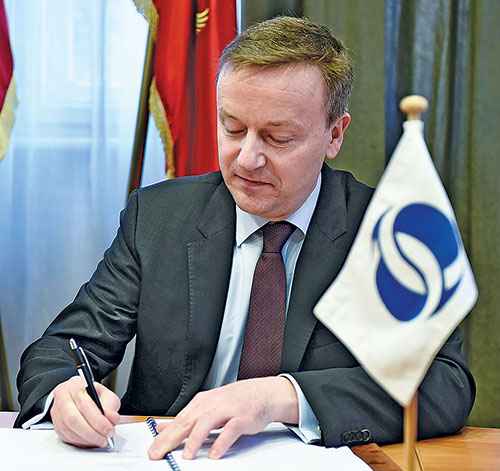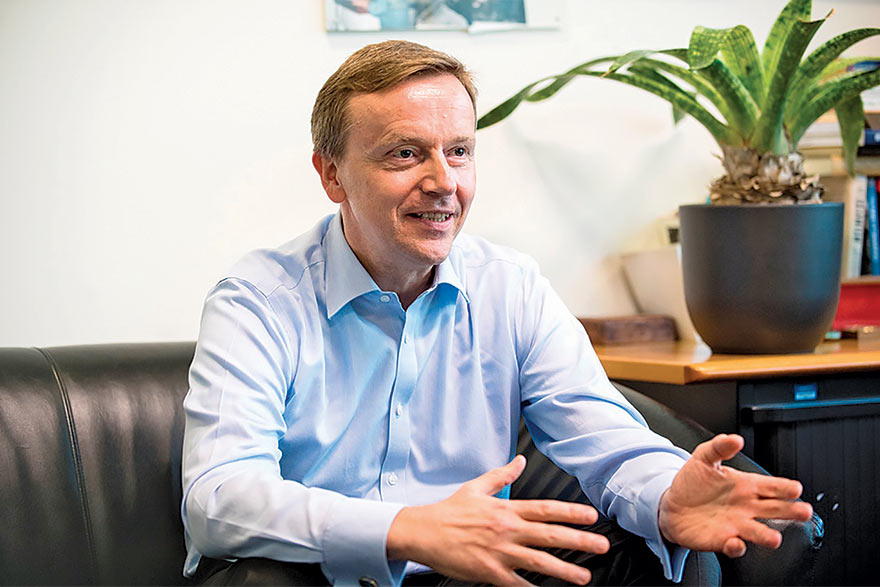The epidemic has highlighted that Montenegro requires a more diversified economy with less reliance on tourism, while the tourism sector needs serious measures to diversify and increase its competitiveness. As in other countries, the speed of Montenegro’s recovery will depend on the ability of the state to contain the epidemic and the availability of an effective vaccine that can be deployed
COVID-19 has had a significant impact on Montenegro’s economy, because of the country’s strong reliance on tourism, which accounts for more than 20 per cent of GDP — one of the highest percentages in the world, says Jaap Sprey, Head of the EBRD in Montenegro. According to the EBRD’s September forecast, GDP will contract by 9.0 per cent in 2020 and recover by 5.0 per cent in 2021. Downside risks are significant, as social distancing and other lockdown restrictions may well continue into 2021.
“The government had no other choice but to intervene forcefully, and that’s what it did”, says Sprey. “While the measures successfully mitigated the consequences of the pandemic for individuals and companies, they were expensive. As a result, EBRD economists expect Montenegro’s public debt to increase from close to 80 per cent of GDP at the end of 2019 to 90 per cent of GDP by the end of 2020,” warns our interlocutor.
Given the new developments, how has the EBRD responded to the short term and long term challenges the country is facing?
– The COVID-19 pandemic and its economic consequences present an unprecedented challenge, but the EBRD is well-placed to support its clients, partners and the regions where it works, and to support them through the crisis and prepare them for the post-virus era. The longer this crisis continues, the stronger we believe that overcoming the short term challenges and addressing the longer term challenges become one and the same: build a more sustainable, resilient, equitable and inclusive economy.
In March, the EBRD unveiled an emergency €1 billion “Solidarity Package” of measures comprising emergency liquidity, working capital and trade finance. The EBRD is today committing all its activity in 2020-21, expected to amount to investment of at least €21 billion, to help its regions counter the economic impact of the coronavirus pandemic.
But the EBRD is about more than “just” finance. We are also engaged in policy dialogue and offer extensive advisory services and technical cooperation.
We expect to invest over €160 billion in Montenegro this year: through a Resilience Facility for private sector clients with strong business fundamentals that experience temporary liquidity problems; an expanded Trade Facilitation Programme, where we increased our cooperation with Hipotekarna Banka and included NLB Banka; restructuring support for distressed clients, while maintaining high standards of accountability; enhanced frameworks with local partner financial institutions, such as Hipotekarna Banka and Alter Modus, to reach out to micro, small and mediumsized enterprises. We also increased our stand-by agreement with the Deposit Protection Fund; a Vital Infrastructure Support Facility with support to EPCG to finance working capital, stabilisation and essential public investment; advice for Small Businesses – training, in a virtual format, on liquidity and human resource management in the COVID-19 crisis. We scaled up our advisory on digital transformation, as well as through policy advice to the authorities, e.g. we are cooperating with the authorities to enhance the institutional capacity of business inspections, whereas our Secretariat to the Competitiveness Council has prepared a register of all levies in Montenegro.
The recovery of the tourism sector will depend on how fast the epidemic can be contained, most importantly through effective vaccination and the severity and duration of still necessary containment measures
To what extent did the EBRD have to adjust its original plan of intervention in Montenegro?
– We signed 10 projects and invested nearly €40 million in 2019. Early this year, prior to COVID-19, we had planned to almost double our business volume, to €75 million, in 2020.
In light of our extra support to fight the impact of the pandemic, we are now on track to at least triple last year’s business volume, with nearly 20 investment projects.
Our Advice for Small Businesses programme continues to support SMEs in withstanding and recovering from the economic fallout of the pandemic by relaxing client contributions, refocusing ongoing projects on critical issues of financial management and business continuity, and promoting digital delivery of advice.
We have a pipeline in tourism & property that we aim to realise in 2021, and we will continue to strengthen agribusiness value chains and backward linkages in the tourism sector. We are also focusing on investments in the renewables sector and strengthening public-private dialogue with the Secretariat to the Competitiveness Council.
How badly has the Montenegrin tourism sector been hit and how does this influence your focus on strengthening competitiveness in the tourism sector?
– The number of tourists arriving in Montenegro has been rising steadily in recent years. This year, however, the pandemic had a strong negative impact on tourism worldwide, including in Montenegro. Foreign tourist arrivals declined by over 80 per cent year-on-year in the country, while exports, consisting mostly of tourism-related services, recorded a fall of 35.5%.

The recovery of the sector will depend on how fast the epidemic can be contained, most importantly through effective vaccination and the severity and duration of still necessary containment measures.
The epidemic has highlighted that Montenegro requires a more diversified economy with less reliance on tourism, while the tourism sector needs serious measures to increase its competitiveness. In our view, the country needs to further diversify the tourism model away from the “sun, sand and sea” model by developing other offerings, e.g. mountain or health tourism. This can also help extend the very short tourist season and diversify the range of countries sending tourists.
To what extent has COVID-19 spurred digital transformation in Montenegro, and how do you assist in this change?
– Digitisation has advanced worldwide as a result of containment measures. Remote working has become the norm for millions, while e-administration and internet shopping progressed further. The advancement of digital transformation offers good opportunities where the IT sector is advanced, but is especially painful where physical work is a concern. It is possible to almost fully replicate an office at home, but it is not possible to assemble a car in your bedroom.
At the EBRD, we actively support SMEs that – in light of the lockdown – have turned to digital channels to maintain or innovate their business models. We have done so through our Advice for Small Business programme, which provides advisory support in ICT solutions as well as other areas, such as marketing, strategy and management. The number of applications for support to introduce e-commerce, improve companies’ online presence or adjust the business model to new digital demands has risen significantly.
EBRD economists expect Montenegro’s public debt to increase from close to 80 per cent of GDP at the end of 2019 to 90 per cent of GDP by the end of 2020
Besides providing direct advisory support, we also organise training and workshops for SMEs, where we also focus on digital transformation. As part of our COVID-19 response, we have launched the EBRD Know How Academy, a free of charge e-learning platform for micro and small businesses that offers advice and tools to companies for dealing with the impact of COVID-19.
The crisis and resulting digital transformation made it clear that all parts of Montenegro need access to affordable, high-speed internet. This is why, with the support of the Western Balkans Investment Framework, we launched a feasibility study on regional broadband development in Montenegro. The objective is to identify so-called white zones, i.e. rural areas that are currently without broadband infrastructure, with a view to develop models to have them fully covered, potentially with EBRD financing and support.
How would you assess the current state of Western Balkan integration, in terms of the development of transport and energy infrastructure links both within the region and among neighbours? What is the status of projects supported by the EBRD?
– Regional integration of transport and energy infrastructure has been advancing gradually in the Western Balkan region. We have implemented motorway projects along the main transport corridors and financed several energy interconnectors for electricity and gas. In the case of Montenegro, a recent example is the undersea transmission cable to Italy, which has been operating since 2019.
Nevertheless, an upgrade and expansion of the networks will be needed to better connect the region to Central Eastern and Western Europe.

Improving Montenegro’s connectivity to markets in the region and beyond is one of the EBRD’s main objectives. In the energy sector, for instance, we are financing the overland power transmission line from Donja Lastva, where the link to Italy comes onshore, to the northern town of Pljevlja.
We are currently involved in various regional and local road infrastructure projects, such as Podgorica – Danilovgrad, Jaz – Tivat and Rozaje Spiljane and the local road Jezerine – Lubnice. We have also funded studies for the next sections of the Bar – Boljare Highway and the Blue or Adriatic Highway. However, we recommend serious consideration before going ahead with these projects, given the current lack of public fiscal space.
Besides a few projects in the railway sector, we supported the Port of Adria in the port of Bar and have expressed our interest in financing the modernisation of Montenegro’s airports.
How has your Women in Business programme supported female entrepreneurs during COVID-19?
– Our Women in Business programme is a comprehensive programme designed to promote women’s entrepreneurship by combining access to finance and knowhow. The programme has been active in Montenegro since 2014 and we have supported more than 100 women-led businesses to date, through direct advisory support with local consultants or workshops for enhancing entrepreneurial skills in areas such as finance management, leadership, digital marketing, ICT solutions and organisational development. We implement this programme in cooperation with two donors: Sweden and Luxembourg.
Women-led businesses are often more vulnerable to external shocks like the COVID-19 crisis. This is why in March, in cooperation with partner financial institutions Alter Modus and NLB Podgorica, we added dedicated women in business credit lines for a total amount of three million euros in order to provide female entrepreneurs with better access to finance, which is often a business barrier as women entrepreneurs have fewer assets or lack collateral. We also provided technical assistance to the partner institutions to help them offer financial products and better target the needs of women entrepreneurs.
| SUPPORT
The COVID-19 pandemic presents an unprecedented challenge, but the EBRD is well-placed to support its clients, partners and the regions where it works. | GOAL
Improving Montenegro’s connectivity to markets in the region and beyond is one of the EBRD’s main objectives. | NECESSITY
The crisis and the resulting digital transformation made it clear that all parts of Montenegro need access to affordable, high-speed internet. |
|---|